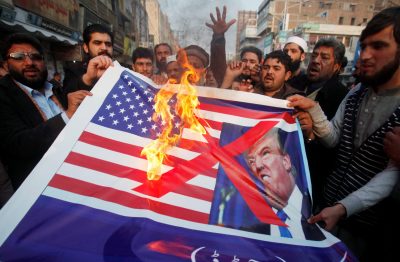Author: Michael Kugelman, Wilson Center

The aid freeze sparked a predictable uproar in Pakistan. Officials angrily declared that their country has already cracked down hard on terrorists, and to their credit, terrorist violence has plummeted in recent years. Pakistan’s military launched an offensive against the Pakistani Taliban (the group responsible for the majority of attacks in Pakistan over the last decade) in the tribal region of North Waziristan in 2014. According to the South Asia Terrorism Portal, civilian deaths from terrorist violence dropped from 1800 in 2014 to 540 in 2017.
This good news only gives half the picture.
While the overall number of terrorist-related deaths are down and the capacities of Pakistan’s chief terrorist groups have been severely degraded, terrorism still stalks Pakistan in a big way. Terrorist groups other than the Pakistani Taliban — including the Afghanistan-focussed Afghan Taliban and Haqqani Network as well as the India-focussed Lashkar-e-Taiba (LeT) and Jaish-e-Mohammed (JeM) — continue to enjoy a presence in Pakistan. They do not stage attacks in Pakistan, but they do use it as a sanctuary. Pakistan allows this (and in some cases provides other forms of support) because it views them as useful asymmetric tools to push back against its more powerful foe: India.
LeT and JeM stage attacks in India. The Afghan Taliban and Haqqani Network mostly target Afghan and US citizens in Afghanistan, but they are virulently anti-India and go after Indian targets in India. Pakistan derives ample benefits from maintaining ties to these terror groups. It will not sever those ties merely because of US pressure.
How will the Pakistani military cope with the aid suspension? The reflexive response in Pakistan is that the country will weather it with ease. Washington has cut aid to Pakistan in previous years, including after it became a nuclear state in 1999 and more recently after its forces discovered Osama Bin Laden in the country in 2011. Each time, Pakistan has survived.
The conventional wisdom is that Islamabad can turn to its time-tested friend China, to other long-standing allies like Saudi Arabia or even to newly emerging defence partners like Russia, Ukraine and Turkey to compensate for the loss of US largesse.
This is true to a substantial extent. Defence trade experts believe that Chinese arms sales to Pakistan on an annual basis have surpassed those from the United States in recent years. Products provided by China have included tanks, submarines and combat aircraft. The latter item is particularly notable given that a deal for the F-16 fighter jet — an aircraft that was a powerful symbol of the US–Pakistan defence partnership — fell through during the final months of the Obama administration.
On the other hand, the aid freeze could weaken the capacity of existing Pakistani military supplies. If the freeze was to include a suspension of maintenance, servicing and spare parts provision, this could cause problems for Pakistan’s current F-16 fleet and its other aerial equipment. This would be significant given that maintaining existing weaponry is arguably just as important as securing new materiel. What remains unclear is if another defence partner can step in to plug these gaps.
The aid freeze has other potentially negative consequences for Pakistan. Islamabad has long valued its military cooperation with Washington not just because of the ‘guns and money’ but also because of the prestige factor. There is something to be said about enjoying a partnership with the world’s sole superpower. Military collaboration has also afforded Pakistan access to other US military resources, such as study arrangements at US military academies and other training opportunities for Pakistani military forces. Extended aid freezes — particularly if coupled with additional punitive measures that further undercut bilateral security cooperation — could reduce if not eliminate these opportunities.
Pakistan’s military will survive the aid freeze. But despite the defiant rhetoric emanating from Islamabad, the freeze won’t necessarily be cost-free.
Michael Kugelman is the Asia Program Deputy Director and Senior Associate for South Asia at the Wilson Center. He can be found on Twitter @michaelkugelman.
The article appeared in the East Asia Forum on
